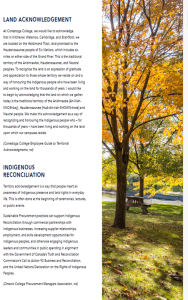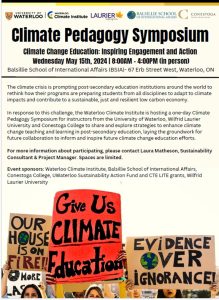Blog Post #8 Professional Development Plan Reflection
I attended the Climate Pedagogy Symposium, Climate Change Education; Inspiring Engagement and Action (May 15th, 2024; see the poster on page four) for a full-day professional development activity. The activity was valuable in expanding my learning about infusing and incorporating sustainability education into the courses for which I am the faculty providing curriculum guidance. The session was promoted at Conestoga College as part of our journey to building our capacity as a signatory of Principles for Responsible Education Management (PRME) and our membership in the Association for the Advancement of Sustainability in Higher Education (AASHE). Both are guiding the College School of Business in planning how we approach teaching positive outcomes in education related to sustainability, climate action, and the Sustainable Development Goals (SDGs), preparing students as future leaders in the business world.
The session was a joint symposium through Waterloo Climate Institute (https://uwaterloo.ca/climate-institute/events/climate-pedagogy-symposium), and Conestoga College, Wilfrid Laurier University, University of Waterloo and Balsillie School of International Affairs. The day included opportunities to attend selected sessions on topics related to pedagogies for building a sustainability curriculum.
“The real language is in our feet – how we walk it.” Elder Norma Jacobs
A personal reflection on the event.
The Climate Pedagogy Symposium was a significant gathering of instructors from the University of Waterloo, Wilfrid Laurier University, and Conestoga College coming together for the first time on a shared interest and global issue of climate change. The shared goal was to enhance climate change teaching and learning in post-secondary education. Here are my reflections on the outcomes of this symposium:
- Collaboration and Insights: The symposium provided a platform for educators to collaborate across institutions. By sharing strategies and insights, we began a conversation that collectively addressed the urgent need to prepare students for the climate crisis. This collaboration is essential for fostering interdisciplinary solutions and could serve as a template for interdisciplinary work within our college.
- Indigenous Perspectives: Including Indigenous elders’ insights was a powerful aspect of the symposium for me. Their traditional knowledge and connection to the land offered a unique perspective on climate change. Incorporating Indigenous wisdom into curricula enriches climate education and grounds us with historical roots and foundations. This aligned nicely with the coursework on considering Indigenous perspectives in teaching and learning innovation.
- Action-Oriented Approach: The focus on actionable strategies—such as instructional techniques, emotional engagement, and cross-cultural dialogues as a way to and a commitment to empowering students. We explored ways to move beyond theory and inspire tangible actions toward sustainability. The one question I ask is, what do we want our students to do about sustainability due to the education we provide?
- Social Justice: The symposium had sessions that emphasized resilience and justice. There was a recognition that addressing climate change requires scientific knowledge and ethical considerations. A just and resilient low-carbon economy must prioritize marginalized communities and ecological balance.
- Future Impact: The compilation of the discussions serves as a valuable resource for me, informing my curriculum development work, inspiring innovative teaching methods, and encouraging ongoing dialogue. The ripple effect of this symposium extends far beyond its one-day duration, as plans are in the works for an annual event to carry on the dialogue.
In summary, the Climate Pedagogy Symposium stressed the urgency, collaboration, and holistic approach needed to equip students with the tools to navigate our changing world and make us, as educators, reflect on how we can achieve this outcome.
Ties to my professional practice.
The symposium aimed to enhance climate change teaching and learning in post-secondary education. Here are some of my key observations that tie into my professional practice:
- Collaboration: The event facilitated collaboration between institutions and different instructors who shared strategies, fostering a collaborative approach to climate education as a common topic and challenge we all face. It was great to make new connections that I can call upon to carry on discussions in areas of common interest. It was also an excellent opportunity to connect with experts and look for ways to bring that expertise back to Conestoga College, for example, by inviting experts to join our Sustainability Speaker Series,
- Program Development: Through exploring instructional strategies and addressing topics such as games, active learning, assignments, and community engagement, these discussions informed ways to enhance existing sustainability and climate change program curricula. This was most helpful as we participated in the activities or games to experience them firsthand.
- Networking Opportunities: The symposium provided networking spaces, allowing attendees to connect, exchange ideas, and build professional relationships. Networking is crucial for staying informed and fostering a supportive community, as reflected in the assignment on building our Personal Learning Network.
This discussion is closely linked to the critical points made in the reflection on the event, and in some cases, I could interchange the ideas between these two sections. Overall, the symposium emphasized the need for institutional and interdisciplinary connections to ensure that diverse perspectives are incorporated into personal learning and that support the essential need for climate change education in our programs.
“How do we change our human mindset from wanting to control our resources to caring for our resources?” Michael Quartermain
Two artifacts that demonstrate the impact of this professional development opportunity
Artifact 1- E3 Building Sustainability curriculum: The Piedmont Ponderosa Model and Stories from the Frontline
This artifact is the faculty training session delivered May 29th during the college-wide Employees for Excellence in Education Conference (E3) on May 29th. My presentation topic was Building Sustainability Curriculum: The Piedmont/Ponderosa Model, Stories from the Frontline. I connected with Dr. Geoff Chase to co-present with me and included this connection in my Personal Learning Network.
This supports building a sustainability curriculum pedagogy following the Piedmont Ponderosa Model for faculty looking to build sustainability into their curriculum. The connection to the symposium involves collaboration, interdisciplinary studies and action-oriented outcomes. The core of the presentation was built around storytelling.

(Conestoga College of Technology and Advanced Learning, 2024)
Artifact 2 Conestoga College Sustainable Procurement Guidelines, May 2024
Another connection to be made in discussing my PLN is in a college or university setting where faculty meets functions. In this artifact, I was involved in developing sustainable procurement guidelines as a starting point to introduce the idea and build a mindset around sustainable procurement at Conestoga College. The symposium session reminded me of our opportunities to consider Indigenous perspectives in procurement from the idea of social procurement and, more specifically, how it can be linked to Indigenous reconciliation.

Who would you recommend this activity to and why?
I recommend this symposium or any similar symposium to build new knowledge and create connections. Professional development fosters a culture of curiosity and innovation, driving me to acquire new skills and knowledge consistently and increase adaptability in the face of changing global world and technological advancements. Ultimately, the pursuit of lifelong learning is rewarding.
(Conestoga College of Technology and Advanced Learning, (2024). Sustainable Procurement Guidelines May 2024)
Appendix: Program Infographic – Climate Pedagogy Symposium

(Waterloo Climate Institute, 2024)
References
Conestoga College of Technology and Advanced Learning, (2024). Employees for Excellence in Education (E3) Conference. [Website]. https://www.conestogac.on.ca/professional-development/employees-for-excellence-in-education-e3
Conestoga College of Technology and Advanced Learning, (2024). Sustainable Procurement Guidelines May 2024 (PDF]. Retrieved from https://www-assets.conestogac.on.ca/documents/www/about/policies/purchasing/sustainable-procurement-guidelines.pdf
Waterloo Climate Institute, (2024). Climate Pedagogy Symposium: Climate Change Education, Inspiring Engagement and Action [Infographic]. University of Waterloo. https://uwaterloo.ca/climate-institute/events/climate-pedagogy-symposium

